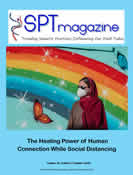Our Annual Book Review Issue is Here
Maintaining our traditional summer focus, we are pleased to share reviews of books “hot off the press”, author reflections on their writing experience, and articles from our regular contributors. As a courtesy to our subscribers, we will email a special link to access the complete PDF. And, make sure we don't leave anyone out, we're also posting each review, reflection and article individually over the next several weeks.
Get In-Touch with Touch: A Powerful Tool for Emotional and Physiological Regulation
During the workshop, she will begin by looking at some key scientific aspects of the neurobiology of touch and how they relate to the diverse uses of touch in Biodynamic psychology. Scientific findings
underpin our understanding of the use of touch clinically. She will explore an updated understanding of the place of touch in the therapeutic encounter, referencing current research on the neuroscience of touch, affective touch, attachment, and trauma using clinical examples and integrated experiential work.
She will pay attention to the phenomena of embodied transference, countertransference, resonance and interference (Boadella, 1981) whilst negotiating the dilemma: to touch or not to touch, and, if to touch, how to touch. Exploring how we as psychotherapists can “hold the possibility of touch, as it can be both an appropriate or inappropriate therapeutic intervention” (Asheri, 2009 page 108).
Second Editions: Are They Worth The Work?
I focus my reviews on prepublication manuscripts and “hot-off-the-press” texts. Because I’m a small niche publication, I try to offer readers material they cannot get else where.
But I started to wonder about revised and second editions. All things considered, it can take years for people to write and publish their work. The time, the turmoil, the tears. It takes a toll. Combine joy, release, and celebration to that mix? You just might create a tsunami of emotional and/or physical impact on one’s body and soul.
The question nudging my brain awake at 2 am was: Why do authors go through that ordeal with the same material? Isn’t once done, good enough?
State Change is the Name of the Game: Further Adventures with Master Teacher John...
John Chitty, RPP, RCST®, (1949-2019) had many passions in his work: The two-chair method (working with polarity and pendulation), babies, relationships, energy medicine, states of health versus pathology, and autonomic nervous system state change. He had advice for every occasion from personal tragedy to business practice. He told several stories over and over again, which clued me into things he was most passionate about. One of them was the following, stated in an adamant and sometimes outraged insistent tone:
“I have people coming in here and telling me that they want to get to root of their trauma to be rid of it once and for all. Well, I don’t think that you need to get to the root of trauma; all you need is state change. (picks up hand and points at me) State change is the name of the game (inflection and repeated pointing with every word).”
“Yes sir!” I’d say.
Our Summer issue is now digital
We've just posted our summer book review issue on issuu.com for those wanting a digital read of the entire magazine. We're working on embedding it on our site as well. Stay tuned for more exciting advances.
An Honorary Urban Anthropologist
Many of my clients are faced with returning to environments which were and are emotionally hostile and traumatizing. They are treated the way they were treated in childhood. Even thinking about these past events resurrects post traumatic stress. But clients believe they have no alternative than to return to those environments. Work, holidays, illness, deaths call for their return. The return then reinforces past emotional wounds. These events occur time after time, but their underlying dynamics are unconscious. I call these events anniversary events (Kisch, 2019). Most often just being aware of returning to these environments is sufficient to trigger anniversary reactions. How does one protect clients from this re-traumatization when just talking about it does not work?
The Psychology of Meditation: Varieties, Effects, Theories, and Perspectives
Peter Sedlmeier offers a representative overview of meditation with a scientific slant in his new book The Psychology of Meditation. Divided into four parts, the text guides readers through varieties of meditation, the effects of meditation, theories of meditation, and concludes with Part 4: Perspectives. He notes that the first 10 chapters build the foundation to support the endpoint, Chapter 11: Perspectives on Meditation Research.
Somatic Psychotherapy Today Volume 11, Number 1, 2021
This issue of SPT Magazine offers articles published online this past year for readers who do not follow us on Facebook and LinkedIn, and for those who want all of the articles in one PDF they can download and read at their convenience. I hope 2022 brings a return of contributors willing to share their experiences and clinical knowledge with our readers.
The Sweetie Pie Syndrome by Ronan M. Kisch, Ph.D.
Sweetie Pie Syndrome typically starts in childhood — it is usually characteristic of females, but it does occur in males. This condition begins as young children are either ignored by or are demeaned by a parent or parents. This behavior can also be role modeled by a parent. As a result of this chronic neglect, abuse, for example, these children develop a sense that a) there is something wrong with them, b) they are basically unlovable, and/or c) if they do not do things to be accepted, they are unworthy. They then develop a behavioral repertoire of constantly trying to do good things and help others to gain a sense of worthiness and lovability. But no matter what or how much they do, the dysfunctional parent perpetually ignores or fails to respond with recognition, positive reinforcement and love. So, the children invest in doing more.
Defne Dinler
SPT is pleased to introduce our newest columnist: Defne Dinler from Denver, Colorado, USA.
Defne is a licensed somatic counseling psychotherapist, specializing in body psychotherapy....













